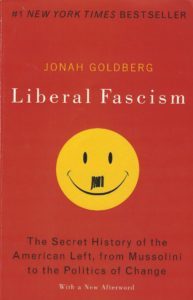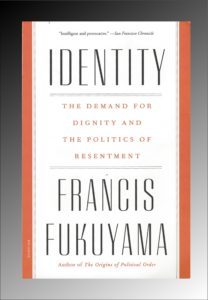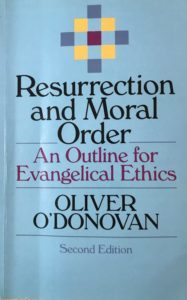Stephen W. Hiemstra's Blog, page 174
November 26, 2019
Goldberg Chronicles Progressivism, Part 1
 Jonah Goldberg. 2009. Liberal Fascism: The Secret History of the American Left, From Mussolini to the Politics of Change. New York: Random House.
Jonah Goldberg. 2009. Liberal Fascism: The Secret History of the American Left, From Mussolini to the Politics of Change. New York: Random House.
Review by Stephen W. Hiemstra
One of the challenges of living and working in Washington DC is that you learn to read the political tea-leaves. When you are young, this prospect sounds intriguing and the temptation is to become a news-aholic. As one grows older, understanding politics leads to cynicism and a realization that when something is broken, it is not an accident—lack of information seldom explains bad policy. Ultimately, one begins to suspect that political awareness taints one’s soul—a form of original sin. Still, as voters and functional adults we have an obligation to be informed about the tradeoffs—politics is a necessary evil.
Introduction
In his book, Liberal Fascism: The Secret History of the American Left, From Mussolini to the Politics of Change Jonah Goldberg writes an historical account of the progressive movement in the United States. He compares and contrasts the progressive movement with fascism in Europe and communism in the former Soviet Union. He writes:
“Fascism is a religion of the state. It assumes the organic unity of the body politic and longs for a national leader attuned to the will of the people. It is totalitarian in that it views everything as political and holds that any action by the state is justified to achieve the common good. It takes responsibility for all aspects of life.”(23)
What makes this task of defining progressivism so slippery is that prior to the Second World War, progressives in the United States, such as Teddy Roosevelt and Woodrow Wilson, provided the template for fascists in Europe.
What changed with the war was that Hitler’s anti-Semitism made it difficult for Americans to see anything good in fascism, in spite of the made-in-USA origin of many of Hitler’s ideas (9). Progressives (or liberals) then began describing anything bad (or anything unprogressive) as fascist, making it hard to define fascism with analytical clarity. The book’s title, Liberal Fascism, was coined by H.G. Wells, a noted progressive, in 1932 (21).
The Third Way
Defining progressivism is understandably difficult because it evolved from the Social Gospel movement and the application of the scientific method to social science in the nineteenth century. The Social Gospel movement of the early nineteenth century strove to prepare the world for the coming of Christ (premillennialism) with campaigns for equal rights for women, abolition of slavery, and abstinence from alcohol. The scientific revolution inspired a pragmatic attitude in social policy focused on results and experimentation, not ideology. Progressive leaders therefore eschewed leftist or rightest policies to craft a third way, which was decidedly non-ideological, and led by experts.
This third-way mantra unified American progressives—Wilson, The Roosevelts, Kennedy, Clinton, and Obama—with European fascists (Mussolini and Hitler) and communists (Lenin and Stalin). This non-ideological stance has proven intensely popular over time and has had a lasting impact on American policies, such as the New Deal and the Great Society. The dark side of this experimentation in public policy arises, not from unpopular ideas being imposed by “crazed” leaders, but by the prejudices that societies insist on acting on from time to time.
Background and Organization
Jonah Goldberg (1969+) is a conservative columnist, born and raised Jewish in Manhattan, New York. He attended Goucher College in Towson, Maryland. He writes in ten chapters:
Mussolini: The Father of Fascism
Adolf Hitler: Man of the Left
Woodrow Wilson and the Birth of Liberal Fascism
Franklin Roosevelt’s Fascist New Deal
The 1960s: Fascism Takes to the Streets
From Kennedy’s Myth to Johnson’s Dream: Liberal Fascism and the Cult of the State
Liberal Racism: The Eugenic Ghost in the Fascist Machine
Liberal Fascist Economics
Brave New Village: Hillary Clinton and the Meaning of Liberal Fascism
The New Age: We’re All Fascists Now
These chapters follow an introduction and are followed by two “afterwords”, acknowledgments, appendices, notes, and an index.
Assessment
In part 1 of this review, I provide an overview of the Jonah Goldberg’s Liberal Fascism, while in part 2 I examine his argument in more detail.
Jonah Goldberg’s Liberal Fascism offers a conservative reading of the last century of progressive politics both in the U.S. and Europe written in journalistic style. The title of the book, Liberal Fascism, is a progressive self-description coined by H.G. Wells in 1932. The cover art depicting a mustached smiley face captures the tension between strong leadership focused on people’s perceived needs and traditional American skepticism of power unchecked by constitutional restraint.
Goldberg’s history of progressivism documents the genealogy of many of today’s most bitterly debated issues. Did you know that the term, culture war (kulturkampf), dates back to the Bismarck period (late nineteenth century) in Germany? I learned a great deal reading Goldberg. Perhaps, you will too.
Footnotes
The revulsion of U.S. progressives with Hitler’s anti-Semitism could be seen as conveniently hypocritical because German National Socialists crafted their Jewish legislation after American sterilization (Indiana 1907) and other racially-motivated laws, such as the Davis-Bacon Act (1931; 263-266).
https://en.wikipedia.org/wiki/Jonah_G....
Goldberg Chronicles Progressivis
Also see:
Fukuyama Understands Identity
Vance Chronicles White Poverty in America
Other ways to engage online:
Author site: http://www.StephenWHiemstra.net, Publisher site: http://www.T2Pneuma.com.
Newsletter: http://bit.ly/Thanks_2019
The post Goldberg Chronicles Progressivism, Part 1 appeared first on T2Pneuma.net.
November 25, 2019
Anger and Murder: Monday Monologues, November 25, 2019 (podcast)
 Stephen W Hiemstra, 2018
Stephen W Hiemstra, 2018By Stephen W. Hiemstra
This morning I will share a prayer and reflect on Anger and Murder.
After listening, please click here to take a brief listener survey (10 questions).
To listen, click on the link below:
https://t2pneuma.net/wp-content/uploads/2019/11/Murder-Monday_Monologues_podcast_201911125.mp3
Hear the words; Walk the steps; Experience the joy!
Anger and Murder: Monday Monologues, November 25, 2019 (podcast)
Also see:
Monday Monologue On March 26, 2018
Other ways to engage online:
Author site: http://www.StephenWHiemstra.net, Publisher site: http://www.T2Pneuma.com.
Newsletter: http://bit.ly/Thanks_2019
The post Anger and Murder: Monday Monologues, November 25, 2019 (podcast) appeared first on T2Pneuma.net.
November 24, 2019
Gospel Prayer
 Holy Spirit Lutheran Church, Lancaster PA
Holy Spirit Lutheran Church, Lancaster PABy Stephen W. Hiemstra
Merciful Father,
For your guidance in life’s choices, your grace, and infinite mercy, we praise and glorify in your name. There is none like you and you have given access to yourself in the death and resurrection of Jesus Christ.
Forgive our perpetual failings, for we fail ourselves and you daily under law and can only be justified through Jesus’ sacrifice on the cross.
Thank you for his example and for the many blessings that you have lavished on us through loving family and friends. Let us never forget.
In the power of your Holy Spirit, extend faith to our loved ones in spite of themselves and in spite of our weaknesses in witness.
In Jesus’ precious name, Amen.
Gospel Prayer
Also see:
Prayer for Healthy Limits
Other ways to engage online:
Author site: http://www.StephenWHiemstra.net, Publisher site: http://www.T2Pneuma.com.
Newsletter: http://bit.ly/Thanks_2019
The post Gospel Prayer appeared first on T2Pneuma.net.
November 22, 2019
Anger and Murder
 “You shall not murder.” (Exod 20:13)
“You shall not murder.” (Exod 20:13)
By Stephen W. Hiemstra
The Sixth Commandment—you shall not murder—seems cut and dry. In case you missed it, the Bible repeats it five times using the exact same words.1 The punishment for murder—death—is given in the account of Noah (Gen 9:11).
When Jesus talks about murder, he compares it with being angry with and insulting your brother or sister. He then makes a curious comment: [if]
“your brother has something against you, leave your gift there before the altar and go. First be reconciled to your brother, and then come and offer your gift.” (Matt 5:24)
This comment is curious for two reasons. First, at the time when he spoke only priests were allowed to enter the Holy Place in the Temple and approach the altar. Second, this comment appears to make reconciliation with our brother or sister more important than reconciliation with God.
So what is that all about? Jesus is reminding his listeners not of the Temple, but of the first murder story in the Bible—the story of Cain and Abel. He uses it as an object lesson. Cain got angry with his brother, Abel, after Abel brought a better sacrifice to God. For this, Cain murdered Abel (Gen 4:1-8). The lesson is that we should reconcile with each other before anger gets out of control and before we do something that we may later regret (Matt 5:23–24).
Jesus is making two important points.
First, Jesus teaches us to prevent murder by removing the incentive to murder. This lesson can then be applied to all sorts of situations, not just murder.
Second, asking God for forgiveness (bringing a gift) does not erase the sin that we have committed against one another. If we murder someone, asking God’s forgiveness does not restore the life lost or heal the emotional devastation experienced by the victim’s family. Forgiveness cannot be just about words.
The point is that asking God for forgiveness, such as repeating a prayer of confession on Sunday morning, neither requires a change of attitude towards our sin (Jesus’ first point) nor compensating those hurt by what we have done (Jesus’ second point). True repentance (a real change in heart) answers the first point; making restitution (compensating our victims) answers the second point.
Does Jesus’ lesson mean that we should never be angry? No. Anger has an object. Some objects of our anger are selfish and evil; some are not.
Jesus clearly got angry about injustice, about those doing business in the temple (John 2:14–17), and about the hard-hearted Pharisees who refused to allow good works, such as healing, on the Sabbath. By contrast, the Pharisees got so angry at Jesus’ healing on the Sabbath (because it made them look bad) that they responded by plotting his death (Matt 12:10–14).
Footnotes
1 Also: Deut 5:17; Matt 5:21; Matt 19:18; Rom 13:9.
Why Not Murder
Also See:
Value Of Life
Other ways to engage online:
Author site: http://www.StephenWHiemstra.net, Publisher site: http://www.T2Pneuma.com.
Newsletter: http://bit.ly/Thanks_2019
The post Anger and Murder appeared first on T2Pneuma.net.
November 19, 2019
Fukuyama Understands Identity
 Francis Fukuyama. 2018. Identity: The Demand for Dignity and the Politics of Resentment. New York: Macmillan.
Francis Fukuyama. 2018. Identity: The Demand for Dignity and the Politics of Resentment. New York: Macmillan.
Review by Stephen W. Hiemstra
The issue of identity is on everyone’s lips today. In the absence of the unity provided by Christian faith, American lives are shrinking into ever-smaller communities of self-interest facilitated by media-friendly cell-phones and social media. As day-to-day, face-to-face interactions, our kids’ social skills leave them ill-prepared to deal with the normal ups and downs of life that threaten their self-worth. Without a solid identity, they are anxious and often leave adolescence with more pills than their grandparents. When I found out that Francis Fukuyama had a book on this subject, I snapped it up.
Introduction
In Identity: The Demand for Dignity and the Politics of Resentment Francis Fukuyama writes:
“In this book, I will be using identity in a specific sense that helps us understand why it is so important to contemporary politics. Identity, in the first place, out of a distinction between one’s true inner self and an outer world of social rules and norms that does not adequately recognize that inner self’s worth or dignity.”(9-10)
In a world where the poorest of the poor anywhere on earth can turn on a television and see how the rich live anywhere else, the sense of what’s fair and what’s not becomes immediately obvious to everyone. Those disrespected through circumstances, law, or persons no longer can be told that that is just the way things are. Dislocation, war, and conflicting demands make it even hard to realize a stable identity and sense of dignity. Fukuyama concludes that the “Demand for recognition of one’s identity is a master concept that unified much of what is going on in world politics today.” (xv)
Origin and Organization
Yoshihiro Francis Fukuyama (1952-) is an American political scientist, political economist, and writer. He is best known for his book The End of History and the Last Man (1992), which argued that the spread of liberal democracies and free-market capitalism of the West could end sociocultural evolution. Fukuyama earned his BA at Cornell University, studied at Yale University, and received his doctorate from Harvard University. He is currently on the faculty at Stanford University. Fukuyama writes in fourteen chapters:
The Politics of Dignity
The Third Part of the Soul
Inside and Outside
From Dignity to Democracy
Revolutions of Dignity
Expressive Individualism
Nationalism and Religion
The Wrong Address
Invisible Man
The Democratization of Dignity
From Identity to Identities
We the People
Stories of Peoplehood
What is to be Don? (vii)
These chapters are preceded by a preface and followed by notes, a bibliography, and an index.
The Dignity Problem
The visibility of inequities has become more obvious. Fukuyama writes:
“Between 1970 and 2008, the world’s output of goods and services quadrupled and growth extended to virtually all regions of the world, while the number of people living in extreme poverty in developing countries dropped from 42 percent of the total population in 1993 to 17 percent in 211. The percentage of children dying before their fifty birthdays declined from 22 percent in 1960 to less than 5 percent by 2016. This liberal world order did not, however, benefit everyone. In many countries around the world, and particularly in developed democracies, inequity increased dramatically, such that many of the benefits flowed primarily to an elite defined primarily by education.” (4)
Economists talk about the law of one price—with free trade, the price of a good or service should be the same everyone, adjusting for shipment, storage, and other costs.
Fukuyama notes the tension created, writing:
“Huge new middle classes arose in countries such as China and India, but the work they did replaced work that had been done by older middle classes in the developing world…women were displacing men in an increasingly service dominated new economy and low-skilled workers were being replaced by smart machines.” (4)
Inequities create indignities because no one enjoys change and we have seen massive changes. Fukuyama notes: “economic grievances become much more acute when they are attached to feelings of indignity and disrespect.” (11) He sees issues like the #MeToo movement and gay marriage as being driven by the desire, not for economic equality, but the desire for equal respect (19).
The Identity Connection
Fukuyama develops his concept of identity writing:
“The modern concept of identity unites three different phenomena. The first is thymos, a universal aspect of human personality that craves recognition. The second is the distinction between inner and outer self, and the raising of the moral valuation of the inner self over outer society. This emerged only in early modern Europe. The third is an evolving concept of dignity, in which recognition is due not just to a narrow class of people [like soldiers and first responders], but to everyone.” (37)
He sees this question of equal dignity motivating the French Revolution and resent uprisings, like the Arab Spring. He tells a story:
“On December 17, 2010, police confiscated the produce from a vegetable cart of a Tunisian street vendor name Mohamed Bouazizi, ostensibly because he did not have a permit. According to his family, he was publicly slapped by a policewoman, Faida Hamdi, who confiscated his electronic scales as well and spat in his face…Bouazizi went to the governor’s office to complain and to get his scales back, but the governor refused to see him. Bouazizi then doused himself with gasoline and set himself on fire, shouting, ‘How do you expect me to make a living.’” (42)
Bouazizi was not a protester or political prisoner, but had been abused and his story set off an uprising—The Arab Spring—that spread across several continents. The problem of indignities of this sort struck a nerve.
Assessment
Francis Fukuyama’s Identity: The Demand for Dignity and the Politics of Resentment pictures our current political climate with rare clarity. He writes with philosophical and historical precision and tells a good story. I enjoyed this book; perhaps you will too.
Footnotes
https://en.wikipedia.org/wiki/Francis....
Fukuyama Understands Identity
Also see:
Vance Chronicles White Poverty in America
Other ways to engage online:
Author site: http://www.StephenWHiemstra.net, Publisher site: http://www.T2Pneuma.com.
Newsletter: http://bit.ly/ID_2019
The post Fukuyama Understands Identity appeared first on T2Pneuma.net.
November 18, 2019
Transcendence and Identity, Monday Monologues (podcast) 20191118
 Stephen W Hiemstra, 2018
Stephen W Hiemstra, 2018By Stephen W. Hiemstra
This morning I will share a prayer and reflect on Transcendence and Identity.
After listening, please click here to take a brief listener survey (10 questions).
To listen, click on the link below:
https://t2pneuma.net/wp-content/uploads/2019/10/Transcendence_and_identity_Monday_Monologues_20191118.mp3
Hear the words; Walk the steps; Experience the joy!
Transcendence and Identity: Monday Monologues, November 18, 2019 (podcast)
Also see:
Monday Monologue On March 26, 2018
Other ways to engage online:
Author site: http://www.StephenWHiemstra.net, Publisher site: http://www.T2Pneuma.com.
Newsletter: http://bit.ly/ID_2019
The post Transcendence and Identity, Monday Monologues (podcast) 20191118 appeared first on T2Pneuma.net.
November 17, 2019
Prayer for Those Confused
 By Stephen W. Hiemstra
By Stephen W. Hiemstra
Merciful father,
All praise and honor be to you, Lord most high, because you created us in your image and have adopted us as your children in Jesus Christ giving life meaning and purpose.
Forgive us for losing our way, forgetting our heritage, and giving into the Spirit of the Age.
We give thanks for your presence in our lives, for health, for family, and for the many blessings.
In the power of your Holy Spirit, grant us strength, clear our minds, and focus us on your will for our lives. May we remember who we are and in whose image we are created.
In Jesus’ precious name, Amen.
Prayer for Those Confused
Also see:
Prayer for Healthy Limits
Other ways to engage online:
Author site: http://www.StephenWHiemstra.net, Publisher site: http://www.T2Pneuma.com.
Newsletter: http://bit.ly/ID_2019
The post Prayer for Those Confused appeared first on T2Pneuma.net.
November 15, 2019
Transcendence and Identity
 “Then God said,
“Then God said,
Let us make man in our image,
after our likeness…
So God created man in his own image,
in the image of God he created him;
male and female he created them.”
(Gen 1:26-27)
By Stephen W. HIemstra
For us as Christians, our identity is secure—we are created in the image of God. If you want to know who you are, look at Jesus, God’s son and our role model or, as I have said colloquially, Jesus is my denominator. Jesus is the measure of all things human.
So why the interest in identity?
If God the father seems illusive and Jesus is just a man, then the whole denominator analogy falls apart. Like it or not, Americans have a problem with the transcendence of God. The fascination in the identity question is therefore a mirror image of God’s evaporating transcendence or, in other words, if God is not real, neither are we.
The Problem of Dysfunction
Being created in the image of God (Gen 1:27) may sound quaint to postmodern ears, but it becomes terribly important in understanding the implications of idolatry, the worship of images other than God. Think of idolatry as a hierarchy of priorities.
The First Commandment makes this point: “You shall have no other gods before me.” (Exod 20:3) The Second Commandment reinforces the point of the first one (Exod 20:4-6). Centering our living on the one who made us gives life meaning and stability. Not doing so, leads to many flavors of dysfunction.
Idolatry and Priorities
The focus on carved images in idolatry suggests pagan temple worship, as the Psalmist makes light of:
Our God is in the heavens; he does all that he pleases. heir idols are silver and gold, the work of human hands. They have mouths, but do not speak; eyes, but do not see. They have ears, but do not hear; noses, but do not smell. They have hands, but do not feel; feet, but do not walk; and they do not make a sound in their throat. Those who make them become like them; so do all who trust in them. (Ps 115:3-8)
The key verse here is the last one: “Those who make them become like them.” Image theology implies that we grow to become like the god that we worship, even if we worship idols. Our number-one priority, which is a question of identity and attitude, is effectively our god (Hoekema 1994, 84). Giglio (2003, 13) writes:
So how do you know where and what you worship? It’s easy. You simply follow the trail of your time, your affection, your energy, your money, and your loyalty. At the end of that trail you’ll find a throne; and whatever, or whoever, is on that throne is what’s of highest value to you. On that throne is what you worship.
Idol worship threatens all that we are because over time we become like the god that we worship.
Idolatry Hampers Spiritual Formation
Focusing only on time, how much time do you spend each week in activities contributing to your spiritual formation as compared with other activities?
Many men spend much of their free time in shoot-them-up video games, often developed by the armed forces for training soldiers. Is it any wonder that, in spite of the fact that automatic weapons have been available since the 1920s, it is only in the last decade that we have seen a rise in mass shootings in public places in the United States unrelated to any political or economic agenda? Intensive activities form us and become part of our identity—spiritual formation is not the only formation that takes place.
Poor formation leads us to worship idols that let us down. When our idols crash, we experience an existential crisis because we must completely reorganize our priorities, which is never easy (Hos 8:4).
The Problem of Suicide
Consider what happens if your number-one priority is work and you lose your job. In spite of record low unemployment, anxiety, depression, drug addiction, and suicide are at record levels in the United States, and have contributed to a decline in life expectancy (Bernstein 2018).
Amidst the high level of suicide (Tavernise 2016), two age groups stand out: young people under the age of thirty and older white men, a group not historically prone to suicide. Among young people, the typically reason for attempting suicide is a broken relationship (idolizing a person); among older men, the typical reason is a lost job (workaholism). Both problems suggest a tie to idolatry.
Death by suicide is just the tip of the iceberg according to Mason (2014, 28):
Based on large national surveys, for every fourteen suicides per hundred thousand people each year, approximately five hundred people attempt suicide and three thousand think about it.
If psychiatric problems, such as addictions, anxiety, and depression, have a spiritual root, then talk therapy and medication can only ease the pain; they cannot solve the problem. A solution requires dealing with the root cause.1
God’s Love
Because we are created in the image of God and are commanded to love him and only him, God’s jealousy is part of his care for us. The Jewish daily prayer, known in Hebrew as the Shema (the name), goes like this: “Hear, O Israel: The LORD our God, the LORD is one. You shall love the LORD your God with all your heart and with all your soul and with all your might.” (Deut 6:4-5) Loving God above all else serves to vaccinate us from some serious problems.
Reclaiming Lost Transcendence
The problem of lost transcendence arises because the world screams at us and attempts to drown out the still, small voice of God. Although God has created us and, in sending Jesus Christ to die for ours, has saved us, we need to make room in our lives—both mind and body—to hear God’s voice.
The whole point of the spiritual disciplines is find space in our lives for God. It is possible to “fake it until you make it” with spiritual disciplines, but this is actually a fool’s errand because God stands outside of time and space—he can approach us but we, being limited in time and space, cannot bridge the gap on our own. Bridging the gap is the work of Christ.
In some sense, our faith in Christ gives us the strength to pursue the spiritual disciplines. The Apostle Paul writes:
“If you confess with your mouth that Jesus is Lord and believe in your heart that God raised him from the dead, you will be saved.” (Rom 10:9)
When we express faith in this way, the Holy Spirit enters our hearts and bridges the gap through out faith in Jesus Christ. Transcendence becomes a reality when we experience salvation and we find a firm identity in Christ.
Footnotes
1 May (1988, 14-16) defines addiction as: “A state of compulsion, obsession, or preoccupation that enslaves a person’s will and desire” and specifically relates it to idolatry.
References
Bernstein, Lenny. 2018. “U.S. life expectancy declines again, a dismal trend not seen since World War I.” Washington Post. November 29.
Giglio, Louis. 2003. The Air I Breathe. Colorado Springs: Multnomah Publishers.
Hoekema, Anthony A. 1994. Created in God’s Image. Grand Rapids: Eerdmans.
Mason, Karen. 2014. Preventing Suicide: A Handbook for Pastors, Chaplains, and Pastoral Counselors. Downers Grove: IVP Books.
May, Gerald G. 1988. Addiction & Grace: Love and Spirituality in the Healing of Addictions. New York: HarperOne.
Tavernise, Sabrina. 2016. “U.S. Suicide Rate Surges to a 30-Year High.” New York Times. April 22. Online: https://nyti.ms/2k9vzFZ, Accessed: 13 March 2017.
Transcendence and Identity
Also See:
Value Of Life
Other ways to engage online:
Author site: http://www.StephenWHiemstra.net, Publisher site: http://www.T2Pneuma.com.
Newsletter: http://bit.ly/ID_2019
The post Transcendence and Identity appeared first on T2Pneuma.net.
November 12, 2019
O’Donovan Splits Ethics into Faith and Action
 Oliver O’Donovan. 2001. Resurrection and Moral Order: An Outline for Evangelical Ethics. Leicester, England: Apollos.
Oliver O’Donovan. 2001. Resurrection and Moral Order: An Outline for Evangelical Ethics. Leicester, England: Apollos.
Review by Stephen W. Hiemstra
When I prepared to defend my doctoral dissertation, I got it all wrong. I practiced the detailed mathematical proofs, thinking that I would be tested on the depth of my understanding of economics. My committee examined me the economic fundamentals. Throughout my career since then, I have come to understand the wisdom of returning to the basics. Ethics works the same way.
In the prologue to Resurrection and Moral Order: An Outline for Evangelical Ethics, Oliver O’Donovan outlines his book with several important definitions:
“The principal orientations of the book are sketched out in the first part. Purposeful action is determined by what is true about the world into which we act; this can be called the ‘realist’ principal. That truth is constituted by what God has done for his world and mankind in Jesus Christ; this is the ‘evangelical’ principle. The act of God which liberates our action is focused on the resurrection of Jesus from the dead, which restored and fulfilled the intelligible order of creation; this we can call the ‘Easter’ principal. Each of these contentions has been challenged, or in some way qualified, in the recent literature in Christian ethics. They offer us, a grid on which to register some of the most important alternatives to the account of Christian ethics which this book advocates.” (ix)
Much of his book is devoted to explaining more fully what these definitions mean and imply with special emphasis on one fundamental truth: “Christian ethics must arise from the gospel of Jesus Christ.” (11)
Origin and Organization
Oliver O’Donovan (1945-) is an Anglican priest and scholar focused on Christian ethics educated at Wycliffe Hall, Oxford. He writes in twelve chapters divided into three parts:
The gospel and Christian ethics
Part One: The objective reality
Created order
Eschatology and history
Knowledge in Christ
Part Two: The subjective reality
Freedom and reality
Authority
The authority of Christ
The freedom of the church and the believer
Part Three: The form of the moral life
The moral field
The moral subject
The double aspect of the moral life
The end of the moral life (v)
These chapter is preceded by a preface and prologue, and followed by a bibliography and indices.
Two-Level Ethics
Although O’Donovan reviews creation ethics (natural law) at great length in part one on objective reality, he does not stop there. Redemptive history—creation, fall, and redemption—reduces to the dualist notion of “’from’ and ‘towards’, in which all the traditional language of good and evil is reinterpreted.” (63)
This two level of moral evaluation is not a novelty. O’Donovan writes: “There are conceived to be two levels at which moral thought proceeds: a fundamental level of intention—the will, in Kant—which makes a simple moral decision in favour of duty and the universal moral law, and a secondary level of empirical discernment which, as it were, merely administers that decision concretely.”(262)
O’Donovan articulates a similar two-level moral framework in Christian ethics. He writes:
“The ultimate and simple decision is not found in the books of human deeds, but in the book of life, where it is a question of Yes or No: either a name is there, or it is not.” (264)
In other words, the most important ethical decision is the intention to follow Jesus Christ. After that comes all other ethical decisions.
Assessment
Oliver O’Donovan’s Resurrection and Moral Order: An Outline for Evangelical Ethics provides a deep dive into Christian ethics beginning with a thorough review of creation ethics. This is a fascinating read for seminary students and pastors. I learned a lot. Perhaps, you will too.
Footnotes
https://en.wikipedia.org/wiki/Oliver_...
O’Donovan Splits Ethics into Faith and Actio
Also See:
Bonhoeffer Introduces Christian Ethics, Part 1
Top 10 Book Reviews Over the Past 12 Months
Other ways to engage online:
Author site: http://www.StephenWHiemstra.net, Publisher site: http://www.T2Pneuma.com.
Newsletter: http://bit.ly/ID_2019
The post O’Donovan Splits Ethics into Faith and Action appeared first on T2Pneuma.net.
November 11, 2019
A Worshiping Community: Monday Monologues, November 11, 2019 (podcast)
 Stephen W Hiemstra, 2018
Stephen W Hiemstra, 2018By Stephen W. Hiemstra
This morning I will share a prayer and reflect on A Worshiping Community.
After listening, please click here to take a brief listener survey (10 questions).
To listen, click on the link below:
https://t2pneuma.net/wp-content/uploads/2019/10/Worshiping_Community_Monday_Monologues_20191111.mp3
Hear the words; Walk the steps; Experience the joy!
A Worshiping Community: Monday Monologues, November 11, 2019 (podcast)
Also see:
Monday Monologue On March 26, 2018
Other ways to engage online:
Author site: http://www.StephenWHiemstra.net, Publisher site: http://www.T2Pneuma.com.
Newsletter: http://bit.ly/ID_2019
The post A Worshiping Community: Monday Monologues, November 11, 2019 (podcast) appeared first on T2Pneuma.net.



